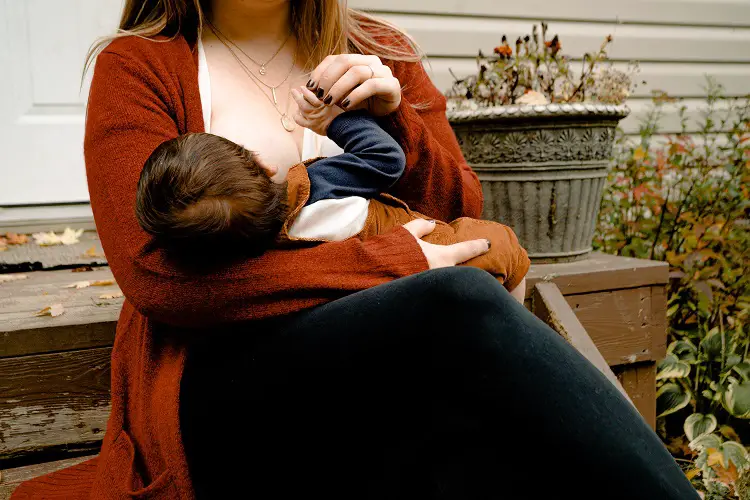Breast milk has immune-boosting components that are dynamic in responding to your baby’s needs from age to time of day and even illness.
Are you unsure if does kissing your baby change your breast milk? Well, it may interest you that the undeniable urge to cover your baby in kisses serves a biological purpose.
When a mother kisses her baby, she samples the pathogens on the baby’s face, which then travels to mom’s lymphatic system. Mom’s body then creates antibodies to fight those pathogens, which the baby receives through breast milk. Interesting, isn’t it?
Read on to discover the mind-blowing ways that breast milk changes, from composition to color to taste.
Amazing Facts About Breastfeeding You May Not Know

1. Your Breast Milk Is LIVE
Breast milk is a LIVE fluid that contains a range of germ-killing substances, healthy bacteria, antibodies, white blood cells, antimicrobials, cell wall protectors, and proteins that helps to protect the body against bacteria and viruses.
The live bacterium in breast milk influences your baby’s gut health. Exclusive breastfeeding will colonize your baby’s gut with healthy bacteria that may have life-long benefits by helping develop resilience against conditions such as diabetes, obesity, and metabolic syndrome.
If you catch a bug, specialized white blood cells will appear in your breast milk to protect your baby. In contrast, if your baby falls sick, the transfer of germs from baby to your breast will stimulate the production of specific antibodies.
These antibodies will be deposited into your milk to boost your baby’s immunity and help her fight off illness. However, some substances in breast milk can also enhance the development of your baby’s immature immune system.
Note, you don’t need a lot of breast milk to help your baby stay healthy according to a report by the Iowa Extension Service, every teaspoon of breast milk your baby consumes has about 3,000,000 germ-killing cells in it; so if a baby gets even one teaspoon a day, it is enough!
2. Breast Milk Changes During Feeding
The fat content of your breast milk changes when you feed your baby and he/she can regulate this by the way he/she sucks as long as you allow your baby to feed as long and as often as he needs.
When your baby is hungry and you begin to breastfeed him, he will firstly get the more ‘watery’ foremilk to quench thirst. As feeding goes on, he will trigger your letdown reflex.
As your milk lets down’ this reflex will be squeezing the higher fat milk or ‘hindmilk’ to your baby to meet his energy needs. Hence, your baby can control the kind of milk he needs at each feed through the kind of sucking he uses, as well as how long he feeds.
3. Breast Milk Changes As Your Baby Grows
The composition of breast milk not only changes during a single feed but nutrients, including macronutrients and immune factor concentrations, change according to the age and development of your baby, providing the perfect food as he grows from birth through to weaning.
For example, studies have shown that the milk of mothers with premature babies contained more calories, a greater fat concentration, more protein, sodium, and secretory IgA (sIgA) than the milk of newborn term mothers.
However long you breastfeed your baby, your breast milk will not ‘lose its goodness’. Some immune factors become more concentrated during the second year of life, right when your baby becomes mobile enough to play with other children and is exposed to a greater array of bugs!
4. Breast Milk Is Different At Night-Time
Your day and night milk have different components. Studies by researchers in Spain have found that night milk contains higher levels of nucleotides (proteins) that stimulate GABA, a sleep-inducing neurotransmitter, and melatonin.
While evening breast milk is rich in tryptophan, which is a sleep-inducing amino acid that is a precursor to serotonin as well as amino acids that aids in serotonin synthesis.
Serotonin is a vital hormone for brain function and development that makes the brain work better, keeps one in a good mood, and helps with sleep cycles.
5. The Taste Of Breast Milk Changes According To Your Diet
It’s thought that exclusive breastfeeding could make your little one a less fussy eater when she starts eating family foods, this is because the flavors of foods you eat will influence the taste of your breast milk, familiarizing your baby with the flavors.
Babies love the taste of vanilla, garlic, and cinnamon-flavored breast milk, (when mothers eat foods with these flavors), so may empty your breasts more effectively, to produce more milk.
6. Breast Milk Is Different For Boys And Girls
While most tests carried out on mothers’ milk have shown that levels of fat, protein, vitamins, sugars, minerals, and hormones vary enormously and there is evidence to suggest that milk made for female and male babies may differ based on circumstances like culture, safety, and the level of income of a family.
Katie Hinde, an Assistant Professor in human evolutionary biology at Harvard University, has found higher levels of cortisol, a hormone that regulates metabolism, in Rhesus Macaque milk for male infants.
Whether this translates to differences in human milk composition between mothers of male and female babies or not, Hinde’s work shows that milk differences could change infant behavior and may affect growth and development.
7. Breast Milk Can Kill Cancer Cells
Studies into the antibacterial agents of mother’s milk reveal that not only does breast milk kill bacteria; mother’s milk can kill 40 different types of cancer cells. This is achieved with the help of a protein in breast milk called ‘Human Alpha-lactalbumin Made Lethal to Tumor cells’ (known as HAMLET).
HAMLET was recently tested on patients who had bladder cancer by Swedish researchers from the University of Lund. After each treatment, the patients’ urine was tested to reveal that dead cancer cells had been excreted yet HAMLET had not affected healthy cells.
8. Breast Milk Contains Stem Cells
Stem cells are passed from mother to baby in breast milk and this helps boost immunity.
Does Kissing Your Baby Change Your Breast Milk?

Yes! That desirable urge to plant kisses all over your baby will also help to boost her immune system. When you kiss your baby, you are sampling the pathogens on your baby skin which are then transferred to your lymphatic system where your body produces antibodies to any bugs.
These antibodies will then pass through your breast milk to your baby then boost her immune system. This system works the same way whenever your baby is exposed to a bug.
Therefore whether you have been exposed or your child has played with another child’s toy or been touched by a doting family member and come in contact with viruses or bacteria, the transfer of your baby’s saliva to your breasts will signal your immune system to make antibodies which are then transferred to your baby in your breast milk, protecting her against potential illness.
Read Also: What Happens If Baby Drinks Spoiled Breast Milk?
What To Do If Someone Kisses Your Baby
A parent or family member’s love and affection is a vital part of every child’s development. However, failing to take proper precautions can be seriously harmful to an infant. Here are problems kissing an infant can cause to a baby.
RSV (Respiratory Syncytial Virus)
RSV is a very serious and potentially fatal condition that can be passed through physical contact or the passing of infected respiratory droplets via a cough or sneeze.
Even if you aren’t feeling under the weather, if you’ve recently had a cold or sinus infection, it’s essential not to hold, touch, and especially kiss a newborn or infant. RSV can cause severe breathing problems and can also affect the heart and brain.
Immune System Vulnerability
Newborns are born with developing immune systems that have to work hard to keep their tiny bodies from fighting off disease and infection. Within the first few months of life, babies are at their most vulnerable stage.
Though that desirable soft cheeks may be tempting, remember to think and bear in mind the risks of kissing the infant when you consider that the germs you are spreading are foreign organisms which can put up a fight against his or her little body.
Allergic Reactions
Be aware that a kiss from someone with food particles or skin-care products can cause or irritate food allergies in a newborn. Whether it’s just chapstick or moisturizer, some ingredients could be harmful to your newborn.
Also, skincare products can cause exposure to seriously harmful chemicals. However, it is important to remember that if an individual has recently consumed nuts, dairy, soy, or other foods that can be the cause of common food allergies, your little one may be exposed to a substance which you are unaware he or she may be allergic to.
Hand, Foot, and Mouth Disease
Hand, foot, and mouth disease are common, this causes ulcers and rashes around the mouth, hands, feet, and leg area. However, there are ways to prevent your baby from getting it or spreading the disease to others.
Though anyone can catch hand, foot, and mouth disease, it’s more common in children under the age of ten. While it’s not typically life-threatening, it can cause different health issues in infants with weaker immune systems, and older siblings who contract the virus may have to miss school for an indefinite period.
Fever Blisters
This one of the most serious health risks that come from kissing babies, this is also known as cold sores. HSV 1 (Herpes Simplex 1) causes fever blisters to form around the baby’s mouth and can spread to other areas of the body, even their brain.
Cold sores are very common in many individuals, so everyone should be aware of before they go to kiss a baby. For some people, this can cause long-term or fatal damage.
Read Also: 19 Useful Ideas On What To Do With Leftover Breast Milk
Cavities
We all are aware of the fact that not maintaining oral hygiene can lead to cavities in the teeth. A lesser-known fact is that the kisses showered on a baby may also cause cavities in the child’s teeth.
The bacteria called streptococcus mutans present in one’s saliva, which, when passed on to the child, can lead to cavities in his tiny teeth. Some people may unintentionally pass on the germs to your child through a kiss or while sharing food with the baby.
To be on the safer side, you (or anyone feeding the baby) should ensure that you don’t spray saliva while blowing on food to make it cool enough for him to eat.
Kissing Disease
Kissing Disease’ is a nickname given to the term ‘mononucleosis’, an infection which is passed through saliva, often through kissing. Although it is known to occur more commonly among teenagers and adults, it can affect infants too.
In infants and children, the condition results in a runny nose or cranky behavior and may also lead to respiratory problems in rare cases. It is a viral disease with no scientific treatment.
The child has to bear with the illness until his immune system helps get rid of the infection on its own. It’s contagious and can pass on to other kids and adults very easily.
Heightened Risk Of Cancer Due To Exposure To Toxic Chemicals
Skincare products are known to contain chemicals that help men and women look young and fresh. Such products may contain parabens, formaldehyde, artificial colors, and much more. These are considered to be endocrine interrupters and have even been found to be associated with risks of cancer.
Hence, people who use such products should avoid kissing your baby. This way, you can safeguard your baby from getting exposed to cosmetics containing such toxic chemicals.
Read Also: What To Eat When Breastfeeding Sick Baby
Precautions To Take While Kissing Your Baby
Each part of the human body is inhabited by bacteria and viruses, which are mostly harmless to healthy adults but can affect newborns. This is because the immune system of newborn babies is not as well developed or strong as compared to that of adults.
Therefore, it is highly recommended that you take the below precautions while cuddling or kissing your baby and urge others to do the same as well.
- Always maintain personal and oral hygiene.
- Always maintain the oral hygiene of your baby as he will be salivating a lot.
- Remember to wash your hands before you attend to your baby.
- Regularly bathe your baby.
- Use baby wipes to clean your baby’s mouth and face to keep him fresh.
- Educate your friends, family, and relatives on these precautions as well, for the safety of the baby.
- Always place baby utensils and hygiene products separate from the belongings of others in the house.
- Many unexpected places and things in the house could be contaminated with germs. It is best to avoid direct contact with the baby immediately after touching the TV remote, dish towels, mobile phones, and handbags.
- People having any sort of infection or the potential to contract infections should stay away from the baby.
- People who have an ongoing respiratory condition like a common cold, influenza, or an undiagnosed chronic cough, chickenpox, or intestinal illness, should avoid kissing the baby.
Read Also: How Much Water Should I Drink While Breastfeeding?
I hope this article “Does kissing your baby change your breast milk” was helpful? If you have any questions or would like to share your tips and experiences while breastfeeding your little, drop your comment or suggestion down below. We would love to hear them.
